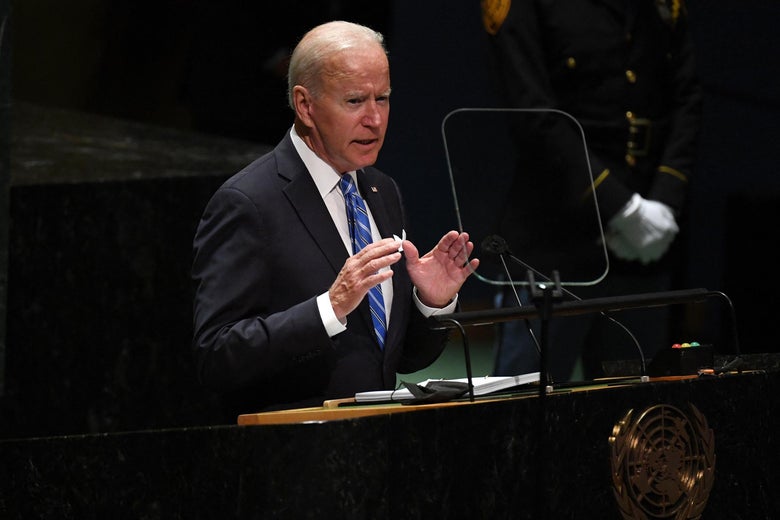FRED KAPLAN

President Joe Biden delivered his first address to the U.N. General Assembly on Tuesday morning, a speech of fine words but discordant resonances. He hailed “the noble mission of this institution” and reaffirmed the central role of “partners and allies,” declaring that “our own success is bound up with others succeeding as well.”
The speech must have struck many in the chamber as a refreshing contrast to Donald Trump’s final address to the Assembly, a seven-minute drone of hectoring and whining that dissed the very concept of mutual security. Still, Biden couldn’t drown out the hubbub over America’s actions—Biden’s actions—of the past several weeks, notably the bungled pullout from Afghanistan and the backroom deal to displace France as the supplier of submarines for Australia.
It wasn’t the actions themselves that caused rancor—there was a good case for leaving Afghanistan, and the Australians were looking to back out of the deal with France, whose submarines were technically inferior, behind schedule, and way over cost. Rather, it was that Biden announced the moves without first consulting the allies, whose central importance he was now lauding before most of the world’s heads of state.
Doing this right wasn’t a complicated matter. Biden and his team could have consulted with the NATO nations, who had spent billions and sacrificed hundreds of their own troops in the Afghanistan war, which they entered as an expression of their own commitment to allied solidarity. He could have given the French a heads-up on the Australian deal and provided some form of compensation for shoving them aside.
There were other dissonances in Biden’s U.N. speech. He said, “We’re not seeking a new cold war or a world divided into rigid blocs,” though his new alliances—the Quad (with India, Japan, and Australia) and AUKUS (with Australia and Britain), as well as the submarine deal that’s upsetting France—are clearly instruments of something that looks a lot like a cold war against China.
He presented himself as the leader of a coalition to “champion democratic values,” but even his forthright caveat—that “no democracy is perfect, including the United States”—failed to capture, much less assuage, the widespread concerns that America, with all dysfunctional turmoil, might not be up to the task. And it was a sour moment when he pledged to “advocate for the rights of women and girls” in Afghanistan, holding the Taliban “accountable” for violations, even as the Taliban are suppressing more and more rights every day and there’s little that anyone can do about it.
Many in the audience must also have sighed when Biden said he is “prepared to return to full compliance” with the Iran nuclear deal “if Iran does the same”—sidestepping the fact that the United States pulled out of the deal, and while it was Trump who committed that strategic misstep, Biden did nothing in his first few months, when he had an opportunity, to step back in line.
But look: Speeches to the General Assembly are bromidic by nature. Few have spurred breakthroughs in peace or diplomacy. They are devices for world leaders to take a stance—to outline their goals and priorities—in broad terms. And Biden’s speech did a good job at doing that. He itemized how much money the United States is spending around the world to wipe out the COVID pandemic, the blight of hunger, the dangers of climate change, and other catastrophes—present or pending—that form this “inflection point in history.” He has returned the United States to international forums, he does value alliances, he was standing before his fellow delegates “for the first time in 20 years that the United States is not at war,” prepared to move from “a period of relentless war” to “a period of relentless diplomacy.” However, the speech underscored what Biden has said explicitly in other forums: that, to restore its standing as the irreplaceable leader, especially in the fractured world of the 21st century, America will first have to repair itself.
No comments:
Post a Comment